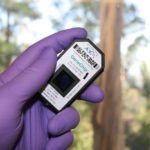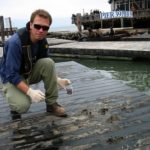To better understand the cause of high counts of potentially pathogenic fecal indicator bacteria (FIB) in the watersheds of the Mahaulepu Valley and Waikomo Stream in southeast Kauai, the Hawaii Department of Health (DOH) commissioned a study by Berkeley Lab microbial ecologists Gary Andersen and Eric Dubinsky. The duo is frequently invited to lead microbial water assessment projects thanks to their expertise and the PhyloChip, a credit card-sized microbial detection technology invented by Andersen and others at Berkeley Lab.
Biosciences Researcher Helps Map the Microbiome of Everything
The Earth Microbiome Project is a massively collaborative effort to characterize all microbial life on the planet. Representing Berkeley Lab, Eric Dubinsky, a guest scientist working with Gary Andersen in EGSB, as well as Neslihan Tas and Shi Wang in the Climate & Ecosystems Science Division (EESA), were among the more than 300 scientists from 161 institutions worldwide to participate in the project. Dubinsky contributed 124 soil samples and metadata he collected from Hawaii. A meta-analysis of all the microbial community samples collected thus far was published Nov. 1 in Nature. This multi-scale reference database gives global context to DNA sequence data and provides a framework for incorporating data from future studies.
Was this page useful?





